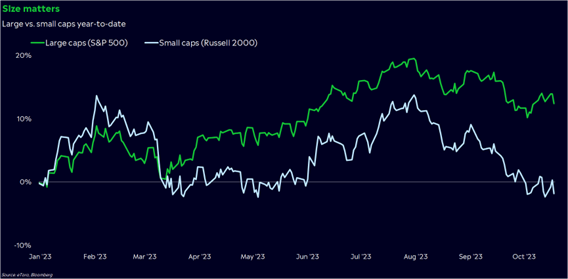TM Editors’ note: This article discusses a penny stock and/or microcap. Such stocks are easily manipulated; do your own careful due diligence.
 Market breadth — or the number of stocks actually rallying with the market — has been a concern all year. But small-caps’ deterioration takes this concern to a whole new level. While smaller stocks are just a slice of the market, they’re typically more sensitive to ups and downs in the US economy. The two biggest industries in the Russell 2000 are industrials and banks, unlike the tech-dominated S&P 500. Small-caps have often been the first group of stocks to cave in the past, too. In the six recessions since 1980, the S&P 500 has peaked an average of three months before the economy has entered a recession. But the Russell 2000 has peaked before the S&P 500 in five out of six of those cases. If the stock market is a leading indicator, small-caps are the leaders of that leading indicator.Of course, this is why people are getting worried right now. Small-caps typically don’t break away this much in a healthy, young bull market. Perhaps they’re warning us of risk ahead.I think there’s some truth to this, even though it looks like we’re in a bull market. Interest rates are the biggest worry on investors’ minds, with the 10-year yield near 5% and the Federal Reserve eyeing several more months of aggressive policy.However, the question may not be if the entire economy is on the precipice of a recession. It’s possible, but unlikely with unemployment this low. Instead, maybe we should be worried that certain parts of the economy — like America’s smallest companies — are on the edge.So, what does this mean for me?Watch small businesses. We often focus too much on well-known, publicly traded companies while ignoring the small public and private businesses that make up a big portion of the economy. Small, unprofitable companies could be the most vulnerable to rising rates, and there may be enough pain to eventually weigh on the job market, your income, and your portfolio.Look for quality. We’ve said for several months now that large, durable companies could benefit in a high-rate environment. Know how your investments make money and keep an eye out for signs of trouble in this earnings season.Think opportunistically. I’m talking to the short-term, high-risk crowd here. If you think small-caps could get crushed at large-caps’ gain, think of ways that you can express that view in your portfolio. Options can be a good tool for complex views if you’re suited for them.
Market breadth — or the number of stocks actually rallying with the market — has been a concern all year. But small-caps’ deterioration takes this concern to a whole new level. While smaller stocks are just a slice of the market, they’re typically more sensitive to ups and downs in the US economy. The two biggest industries in the Russell 2000 are industrials and banks, unlike the tech-dominated S&P 500. Small-caps have often been the first group of stocks to cave in the past, too. In the six recessions since 1980, the S&P 500 has peaked an average of three months before the economy has entered a recession. But the Russell 2000 has peaked before the S&P 500 in five out of six of those cases. If the stock market is a leading indicator, small-caps are the leaders of that leading indicator.Of course, this is why people are getting worried right now. Small-caps typically don’t break away this much in a healthy, young bull market. Perhaps they’re warning us of risk ahead.I think there’s some truth to this, even though it looks like we’re in a bull market. Interest rates are the biggest worry on investors’ minds, with the 10-year yield near 5% and the Federal Reserve eyeing several more months of aggressive policy.However, the question may not be if the entire economy is on the precipice of a recession. It’s possible, but unlikely with unemployment this low. Instead, maybe we should be worried that certain parts of the economy — like America’s smallest companies — are on the edge.So, what does this mean for me?Watch small businesses. We often focus too much on well-known, publicly traded companies while ignoring the small public and private businesses that make up a big portion of the economy. Small, unprofitable companies could be the most vulnerable to rising rates, and there may be enough pain to eventually weigh on the job market, your income, and your portfolio.Look for quality. We’ve said for several months now that large, durable companies could benefit in a high-rate environment. Know how your investments make money and keep an eye out for signs of trouble in this earnings season.Think opportunistically. I’m talking to the short-term, high-risk crowd here. If you think small-caps could get crushed at large-caps’ gain, think of ways that you can express that view in your portfolio. Options can be a good tool for complex views if you’re suited for them.
About the Author
Callie Cox is an investment analyst at eToro U.S. based in Charlotte, N.C. In her role, Callie teaches customers about the power of capital markets in their wallets and in their lives. She’s passionate about helping investors of all skill levels learn how to think about investing, and utilizes engaging content about stocks, crypto, and investments to educate eToro customers and prospects alike.Callie has worked in financial research for her entire career. Prior to joining eToro, Callie worked at Ally Invest, educating customers about investing through a variety of reports, timely market alerts, and strategic initiatives like videos, social projects, and live events.Additionally, Callie has worked with LPL Financial, TABB Group, and Bloomberg. Her work has been featured on CNBC, Bloomberg, the Financial Times, Yahoo Finance, and Barron’s, among other publications. She frequently shares market analysis on Twitter at @callieabost.More By This Author:IPOs: The Lesson Investors Should Take Away From Birkenstock’s FlopFabrinet: A Tech Manufacturing Firm Benefiting From Solid Sales, EPS GrowthWar And Markets: Understanding The Impact Of Geopolitical Shocks













Leave A Comment